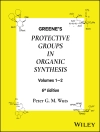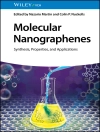An Introduction to Redox Polymers for Energy-Storage Applications
Presents a well-founded introduction to the field or Redox Polymers, with didactical features like summary boxes and a Q&A sections
An Introduction to Redox Polymers for Energy-Storage Applications discusses fundamental aspects related to polymer-based batteries, such as types of batteries, their historic development, design and synthesis criteria of the active material, and summarizes the various types of redox polymers and their applications. Each chapter contains learning objectives, summary boxes, and questions to allow for efficient exam preparation.
In An Introduction to Redox Polymers for Energy-Storage Applications, readers will find detailed information on:
- Fundamental aspects of redox-active polymers, along with their historical classification, taking the key applications of the materials into account
- Energy-storage devices, containing polymers as the electrode active materials, and specific material requirements for the desired applications
- Classification of redox-active polymers, e.g., according to the nature of the actual redox-active moieties, their backbone structure, or topology
- Electrical conductivity of conjugated polymers, covering their most prominent representatives (polyaniline, polypyrrole, polythiophene, and polyacetylene)
An Introduction to Redox Polymers for Energy-Storage Applications also covers the synthesis and applications of these materials, making it an excellent book for graduates, Ph D students, and professionals who are starting in this field.
قائمة المحتويات
1. Introduction and History: Polymers and Batteries
2. Polymer-based Batteries
3. Synthesis of Redox Polymers
4. Conductive Polymers, as Active Materials
5. Sulfur-containing Polymers, as Active Materials
6. Radical-containing Polymers, as Active Materials
7. Carbonyl-containing Polymers, as Active Materials
8. Nitrogen-containing Polymers, as Active Materials
9. Metal-containing Polymers, as Active Materials
10. Redox-active Inorganic Polymers
11. Exam Preparation: Questions and Answers
عن المؤلف
Since 2007, Ulrich S. Schubert, PHD, has been a Full-Professor at the Friedrich Schiller University Jena, Germany.
Andreas Winter received his PHD in chemistry and works as a research scientist at Friedrich Schiller University Jena, Germany
George R. Newkome, PHD, is currently a Research Professor at the Center for Molecular Biology and Biotechnology at Florida Atlantic University in Jupiter, Florida.












